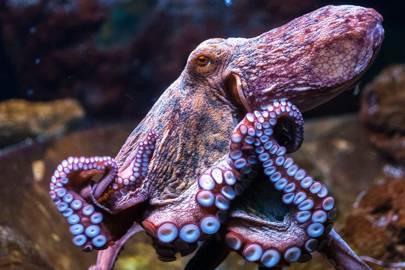“Bill had made the right choice. Though for many months, Octavia’s constant attentions to her eggs were rituals rich and full of meaning, at some point, her tending may have ceased to feel fulfilling. A wild octopus tending fertile eggs is surely rewarded, as are birds on the nest, by the signals that her eggs are alive, her embryos growing. Mother birds and their babies chirp and cheep to one another when the young are still in the egg; the mother octopus can see her babies developing inside the egg, starting with the dark eyes, and feel them moving. But Octavia had no such feedback. Perhaps the very sight of the eggs inspired her to try to protect them, the way a mother orangutan will continue to carry and even groom a dead infant, often for many days, and some dogs will refuse to leave the body of someone they love who has died. Perhaps, now that her eggs are no longer in view, Octavia at last was freed of duties she might have suspected were pointless but had felt compelled to perform. Perhaps now, at last, she could rest.”

(Source)
I have now finished reading The Soul of an Octopus. It’s such a wonderful book. I’ve just read about an encounter with a stump-armed female octopus in the ocean, followed by a visit with Octavia the octopus in the aquarium in her old age, in chapter 8 “Consciousness”.
The Soul of an Octopus is full of interesting facts and descriptions, but it is so captivating and affecting because everything is observed and described with such awe and wonder, such joy and gratitude, and such compassion, that I too am full of curiosity about octopuses and the ocean, and can no longer look at them the same way. In a sense, I feel changed as a person. Once in a while, you pick up a book, expecting nothing, then you’re surprised to find yourself changed because of it. Your perspective’s expanded, your thinking’s shifted.
Sy Montgomery learns, and wishes us to learn, about octopuses—creatures that are so alien and so different from us in everything. We don’t just read about what octopuses are like, she also makes us wonder what it’s like to be an octopus. Their experience of the world is completely different. At the same time, she doesn’t treat them like subjects of study, but like beings, with feelings—she treats them with respect, sensitivity, and tenderness, and seeks to understand them and have a connection with them.
With octopuses, Montgomery could do something Melville/Ishmael couldn’t do with whales—develop a connection, or even friendship, with them.
It’s interesting that I’m writing my dissertation about love and human contact (and motif of touch) in 3 Ingmar Bergman films, and now, The Soul of an Octopus has this passage:
“…We wished she had eaten, but we learned something new: Hunger was not the reason she had surfaced earlier, and it wasn’t what brought her now.That is so moving.
The reason she surfaced was abundantly clear. She had not interacted with us, or tasted our skin, or seen us above her tank for 10 full months. In less than 4 weeks, on a Saturday morning in May, Bill would find her, pale, thin, and still, dead at the bottom of her barrel. Yet, despite everything, we knew in that moment that Octavia had not only remembered us and recognized us; she had wanted to touch us again.”
Everyone should read this book.
sounds like a epiphanal experience... i've always heard Octopi are very intelligent: how nice of an expert to write such a book to let people know about how marvelous they are...
ReplyDeletei hope your dissertation goes well... how long does it have to be?
You should read this book, I think you'll like it.
DeleteMy dissertation has to be 5000-6000 words. Normally it's supposed to be 10000 words, I think, but I'm in film and have to make a graduation film so the dissertation is shorter.